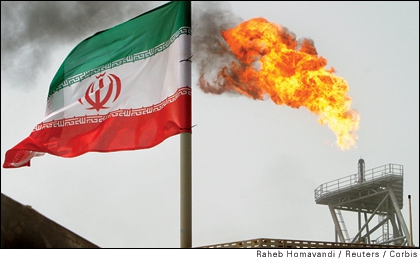Friday 26 October 2012 - 20:43
Story Code : 8779
World's spare oil capacity grows as Iran sanctions bite
(Reuters) - The world's spare oil production capacity outside of�Iran�rose in last two months as gasoline demand waned in the United States and oil use for power generation fell in the Middle East, the U.S. government said in a bimonthly report.
In September and October, spare oil production capacity was 2 million barrels per day, the EIA said, up from 1.8 million bpd in the previous two months, said the report, which is required by last year's Iran sanctions law.
The slightly larger cushion gives room for the Obama administration to continue pressuring Tehran over its disputed nuclear program through sanctions that target Iran's oil revenues.
The sanctions require global importers to buy less Iranian crude or risk being cut off from the U.S. financial system. Tehran has said its nuclear program is strictly for civilian purposes.
The EIA report, obtained by Reuters ahead of its publication, included a steep downward revision in spare capacity in July and August from 2.4 million bpd to 1.8 million bpd due to upward revisions of output from OPEC members�Saudi Arabia�and the United Arab Emirates.
Still, the cushion is relatively thin compared to previous years. "The current level of surplus capacity is quite modest by historical standards," the EIA said, adding that it averaged 3.6 million bpd from 2009 to 2011 and 2.7 million bpd in September and October last year.
While demand fell, global production outside of Iran rose, the report said. Libya, Iraq and Saudi Arabia pumped more crude and the United States continued to draw more oil from its vast shale reserves.
Saudi Arabia, which holds most of the world's spare output capacity, pumped at 9.8 million bpd over the last 60 days, up about 100,000 bpd from the previous two months, the EIA said.
The U.S. and European sanctions have reduced Iran's exports to around 860,000 bpd compared to 2.2 million bpd in 2011, according to the Paris-based International Energy Agency.
While Iran had "precipitous declines" in crude exports, the situation has eased in September and October as most of its customers found ways to insure shipments after the European Union banned reinsurance, the EIA said.
"Preliminary data show a very small increase in global imports of Iranian crude oil since July," the report said, noting the assessment was based on early tanker data and press reports, and could be revised.
The report comes ahead of key decisions faced by the Obama administration in December on whether to extend six-month "exceptions" or waivers to the sanctions to�China, India, South Korea and other importers.
The sanctions law requires importers to make "significant" reductions to oil purchases, measured by volumes and price, to win an exception.
But the law also allows the administration discretion to ensure cuts are not so great that they backfire, pushing oil prices high enough to benefit Iran and hurt allies.
The Iran Project is not responsible for the content of quoted articles.
# Tags











